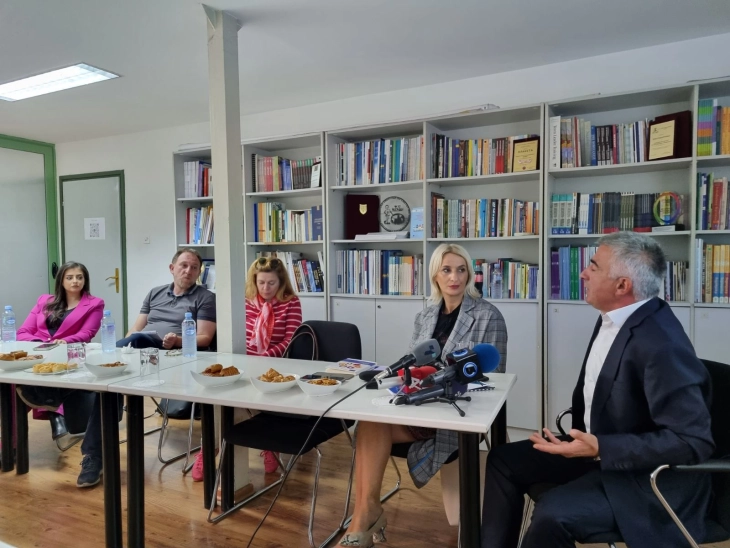Apostoloski: Risk level up, citizens can feel safe
- Considering expert assessment and available parameters, the Israel-Hamas war has resulted in upping the security risk level in the country from "low" to "medium to low". Nevertheless, citizens can feel safe for the time being, said National Coordinator for Prevention of Violent Extremism and Countering Terrorism, Zlatko Apostoloski, on Thursday.

Skopje, 1 November 2023 (MIA) - Considering expert assessment and available parameters, the Israel-Hamas war has resulted in upping the security risk level in the country from "low" to "medium to low". Nevertheless, citizens can feel safe for the time being, said National Coordinator for Prevention of Violent Extremism and Countering Terrorism, Zlatko Apostoloski, on Thursday.
"The level of security services has been upped to a higher degree but this does mean that the threat has reached the highest point," Apostoloski told a press briefing dedicated to the new national strategies for prevention of violent extremism and countering terrorism 2023-2027, recently adopted by the Government.
For us, said Apostoloski, political characteristics of the conflict are not important but the facts on the ground.
"This is the way we build the preventive mechanisms locally, to recognize the leaders who promote a certain side and can mislead our citizens, taking them to battlefields to fight for others' interest and objectives," said Apostoloski.
On the possibility of recruiting people to fight in the Israel-Hamas conflict, he said if it escalates and third parties get involved, it is realistic to expect that support would come from the Western Balkans region, to one or the other side.
"It is too early to say if there is an organized form of recruitment of people from the country that could leave for Palestine. For the time being, other than calls on social media, there is no organized form of recruitment, whereas developments will define situation in the future," said Apostoloski.

He recalled the war in Syria and Iraq, noting that despite the defeat of the Caliphate, its ideology has remained and "the possibility of having centers spreading this ideology in the Balkans is real."
The National Coordinator referred to the possibility of spreading radical ideas in penitentiary institutions, while adding that much has been done to prevent this, including specific procedures and teams monitoring the issue inside the prisons and working on rehabilitation and resocialization of these persons.
"Individual cases are always a possibility but the process of intensive radicalization in prisons has been stopped. There is currently good coordination among security services, including the Ministry of Interior and penitentiary authorities. We have managed to raise cooperation at a high level over the past couple of years. The Ministry of Labor and Social Policy is also involved in the process through its social affairs centers, who are working with these inmates for six months up to a year prior to their release," explained Apostoloski.
According to him, it is important that the returning foreign fighters who are free or serve a prison sentence are treated across nine municipalities, together with their families - women and children.
It is considered that 143 persons left the country for foreign battlefields, 85 of whom have returned, either by themselves prior to sanctioning the crime, or through repatriation. The resocialization programme includes those who have been repatriated, while those who came back by themselves can join the programme at their own will.
Apostoloski said five Macedonian nationals are currently known to be active fighters at the Syria-Iraq border.

The briefing was organized by the Macedonian Center for International Cooperation (MCIC) and the National Committee for prevention of violent extremism and countering terrorism.
Photo: MCIC







